Number 68 Village, located about 41 miles from New Amsterdam has a population of almost 1,100 and is one of the most popular rice growing areas on the Corentyne.
Also named Carnarvon, the quiet village is nestled between Number 67 Village/Boo-dotown to the north and Number 69 Village/Friendship to the south and bounded by the Corentyne River to the east.
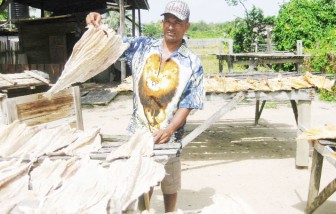
Most of the residents are engaged in rice farming and large-scale fishing businesses, while others earn their living as barbers, welders, teachers, labourers and cattle farmers, and in the case of a few women as seamstresses.
The Skeldon Sugar Estate and the Roadside Baptist Skills Training Centre (RBSTC) in the village are among the places which have provided employment.
Many residents have migrated to North America and left persons to stay in their houses although some have been left unoccupied.
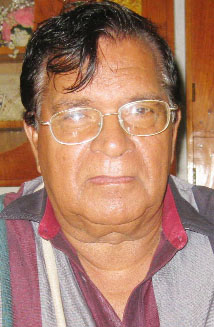
Hazrat Ali along with his wife, Elaine Mendonca, has been operating a salt-fish business for the past six years. He purchases the fish from fishermen at the Number 66 Fish Port Complex and then begins the processing which includes salting and drying it for four days. He would then sell the salted fish – snapper, trout and mackerel – at the New Amsterdam market weekly. Residents would also visit his house to make purchases.
Ali once owned a fishing boat and worked at sea for many years, but found that trade to be “rough.” His boat was hijacked several times, but the worst fate to befall him was when the vessel sank last December, causing him to suffer losses in excess of $3 million.
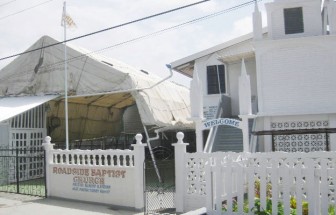
After the boat capsized, three of his five workers stayed afloat in a large ice box. The other two sat on the bow until another fishing boat came to their rescue about half hour later. Ali was grateful that the other boat which was from the East Coast Demerara rescued his workers. He lamented though that the seamen from that boat salvaged two barrels containing 100 gallons of gasoline worth $100,000 but did not hand them over to him.
After making several calls the owners of the other boat finally agreed to return the empty barrels. He also went on a desperate search for his boat but used up three barrels of gasoline in vain.
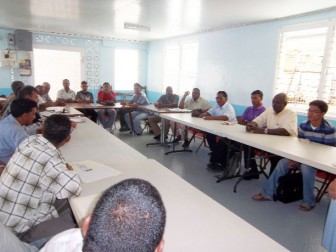
Down at the back of the village, Omanarain Persaud who owns the Etto’s Rice Mill was looking on as some men were drying paddy on his concrete. The men, he said, are employed with a large-scale rice farmer. He purchased paddy from farmers to mill but stopped after he lost over $11 million in 2008. He is now offering a toll milling service, where farmers would dry their paddy and mill it at his factory for a fee.
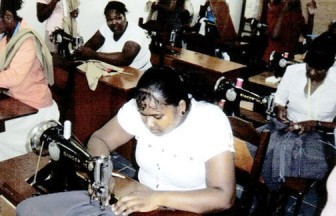
Recounting the loss, Persaud said he made purchases of several hundred bags of paddy at $5,500 per bag. Shortly after that the price dropped to $3,500 per bag and he then had to resell to another mill at $3,300 per bag.
Persaud recently constructed a 320-bag concrete tank and invested in a boiler so farmers can produce parboiled rice for the local market.
Social activities
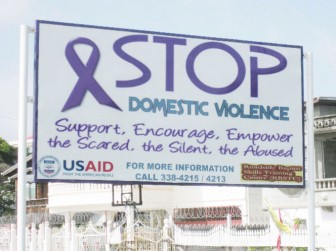
The Number 67 Nursery School is attached to the same building that houses the Number 68 Primary School and they are located at the back of the village.
The cricket ground can be found opposite the schools. Cricket is said to be a favourite sport for everyone and a female team had even been formed. The pavilion is located on a separate plot of land next to the primary school separated by a street, and opposite the ground.
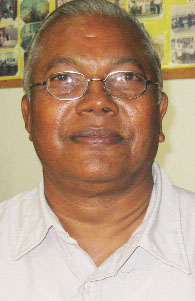
When this newspaper visited, a teacher was sitting in the pavilion with her Grade Four ‘A’ students as she revised with them for their end of term tests. She said she needed the peace and quiet for the children to concentrate.
Cows were grazing on the ground which is in need of upgrading. The fence is also broken and needs to be repaired. A resident said the ground was a bit damaged because of the rain which had also caused games and practice to be stopped temporarily.
After sitting the Grade Six exams the students would move on to secondary schools at Skeldon and other Corentyne villages. Many of the students preparing for exams also attend ‘bottom-house’ lessons after school.
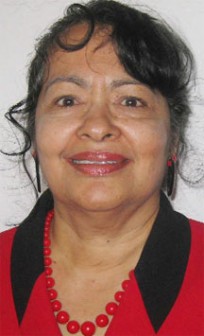
Apart from cricket, a resident said, social activities are mostly limited to weddings and even funerals and wakes. On these occasions persons would “catch up with friends and drink or play card games and dominoes.”
According to him, “on the night before a wedding some of the men would drink and end up in fights and the police would have to be summoned.”
Most of the residents attend religious services at the Christian church or the mandir located in the village.
Residents can access health care at the nearby health centre or at the Skeldon Hospital, while serious cases are referred to the New Amsterdam Hospital.
Dr Parsram Thakur
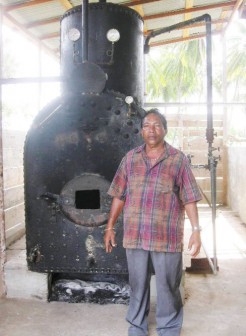
Former resident, Dr Parsram Thakur said the village was formed at the end of the indentured period in the late 1800s and early 1900s when the labourers moved from the Skeldon Sugar Estate. They acquired plots of land that were divided into shares but at that time no drainage system was in place. The surveying of the plots started in 1942 and was completed in 1945.
In 1946, each resident was given a plot for cultivation purposes, but because of the dense jungle they could only farm “up to a point.”
Dr Thakur said residents “did not have the resources and used oxen to plough their rice fields.” Some persons owned two oxen and others who were “well-to-do had four… It took one day to mash 100 bags of paddy.”
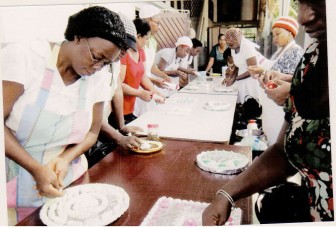
He remembered that “after the residents got shares they went individually to cut the bushes and by 1960 most of it was cleared. An irrigation canal was then opened up and rice cultivation was increased by 200%.”
Dr Thakur served as Director of the University of Guyana, Tain Campus from 2000 when it was established up to 2008 and after that he returned to the USA. He currently resides in Wisconsin on the bank of the Mississippi River where he and his American wife run the Big River Inn Restaurant & Bar that is also attached to a casino.
He is currently holidaying in Guyana and is also writing five books, as well as doing an psychoanalytical study of Dr Cheddi Jagan.
Roadside Baptist Skills
Training Centre (RBSTC)
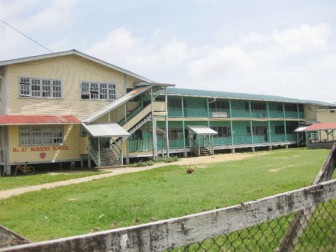
Many persons have become empowered through the RBSTC, a non-governmental organization (NGO) which was established in the early ’90s and offers services for both the young and old.
Chief Executive Officer Nalini Katryan told Sunday Stabroek that the services cater for the “needs of the people and are based on community requests.”
Currently the NGO is engaged in a domestic violence project that is funded by USAID. The centre has erected two signs in the community to “stop domestic violence.”
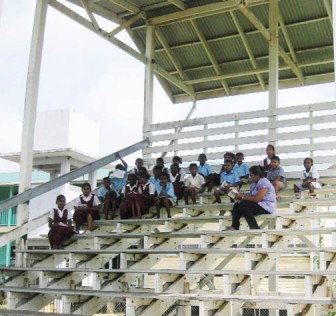
The Ministry of Human Services and Social Security had also launched a White Zone at the centre last November. Since then, Katryan said, many abused women have visited to access the service while some sought help over the phone. She pointed out that the White Zone is very effective because abusive men would become afraid when their wives threaten them that they would call the White Zone.
The building, conveniently located by the roadside, offers remedial education for school dropouts. The one to two-year programme accommodates about 35 students and runs from 8.30 am to 1 pm. Sponsorship is also secured for students who cannot afford to pay the small fee. At the end of their studies they may move on to the Government Technical Institute or the GuySuCo Training Centre.
A second batch of students was training in hydroponics farming and they are hoping to set up shade houses soon. Adult literacy is also offered on a “one-on-one basis” with responses from many persons who have been able to move forward. A public library was also established at the centre in 1990.
The “income-generating” skills centre includes courses in electrical installation, garment manufacturing, catering and floral design. Many of the trainees have since established their own businesses.
The RBSTC which seeks funding through donor agencies, targets school dropouts, abused and disadvantaged women and children and single parents. Recently 60 single women were trained in different skills such as cake decorating and garment making. At the end of the training many were able to access Women of Worth loans to set up businesses.
The youths are also benefiting from the information technology courses, and every year more than 100 students are trained. They have also been able to obtain jobs in that field.
According to Katryan, the centre provides counselling to abused persons and also works with the perpetrators, persons with suicidal tendencies as well as attempted suicide victims.
The NGO also has an active senior citizens’ group that was formed in 1993. The members would meet once monthly for a social programme and to share a meal that they help to fix.
The old folks who would also “talk old time stories” are happy to get away from home and interact with people of their own age. They also get a package to take home.
The centre also offers afternoon care and support twice weekly for orphans and vulnerable children. During that time volunteers would assist the children with school work and counsel them, and conduct “enrichment activities like singing and games.” At the end the children would receive snacks and reimbursement for travelling.
There is training too in such areas as business management and social work, while there is a youth club on Fridays from 5 pm to 6 pm immediately followed by a men’s session for social and interactive activities.
She expressed gratitude to “all donor agencies and the business community, individuals, friends, the government, Roadside Baptist Church and our committed staff.” She appealed to the community to make full use of the services.
Katryan and her husband, Pastor Almond Katryan reside at Skeldon, but they spend most of their day at Number 68 Village. Pastor Katryan told this newspaper that the “centre is an outreach of the church and has grown over the years and is still meeting the basic needs of the wider community.”
He noted that “people are now striving for better education and the services [at RBSTC] have helped to make a positive impact on society. Over 6,000 people have been helped in various skills.”
According to him, they have worked a lot with families and have helped to reduce social problems like drugs. He said even when persons play loud music he would encourage them to consider their neighbours and they would comply.
Further the pastor suggested that some of the lyrics of songs should be banned: “They not only degrade one’s religion but they bring out the beastly attitude of people.”
Meanwhile, he was peeved that persons “would dig up the sea dam at Skeldon to get scrap iron and would leave deep holes.” He said that apart from undermining the dam because of that, the place looks miserable. He is calling on the authorities to look into the situation before it gets out of control.




